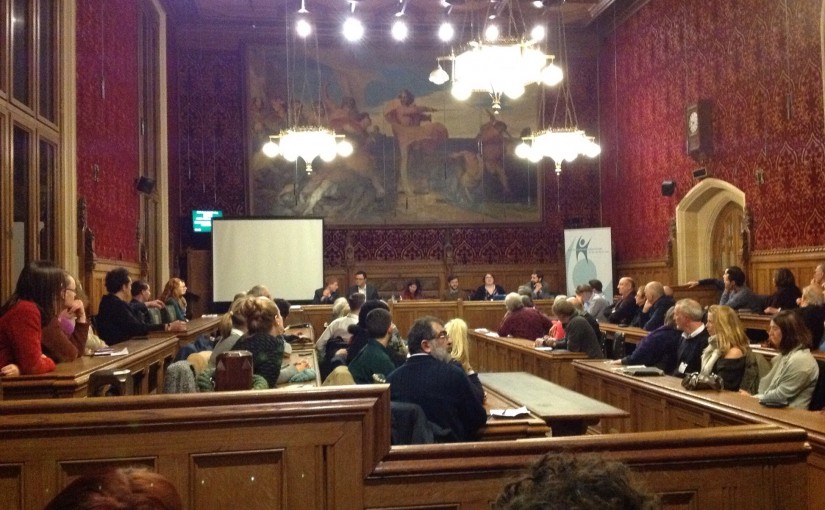By Ian Bushfield and Edwin Hodge
At a recent skeptics conference and during a discussion of the sorts of charlatans and frauds that are best known for peddling woo, a couple of speakers drew upon the image of the ‘conniving Gypsy fortune-teller,’ a stereotype that has frequently been used to describe – and villainize – the Roma people for almost as long as they have lived in Europe.
The story is an old one: a caravan of vagabonds arrives at the edge of town. An elderly crone sets up her shop in a dimly-lit wagon, eager to part the townsfolk from their hard-earned wages. Lured from the safety of the city by the bright lights and raucous music of the travellers’ camp, a local approaches the wagon and is invited in, motivated by a hope of connecting with lost relatives, or eager to learn the secret of gaining wealth, power, or some other desire. The Gypsies, due to their nomadic nature, won’t stay long; just enough perhaps, to swindle the locals and perhaps steal a child or two.
Over time, suspicion grows, and the townspeople begin to accuse the Roma of bringing crime to the community, or of leading their children astray. Suspicion soon turns to resentment, then threats of violence, and the Roma are driven out of town.
Yet like myths of revealed religions, skeptics ought to question whether this Gypsy stereotype truly holds up for the Roma people. This question becomes especially pertinent in Canada and the United States where many Roma are applying for asylum after facing persecution in Eastern European countries. In Canada, and in light of the growing number of asylum seekers, the Harper Government has recently taken drastic efforts to curb what it considers “bogus” claims by Roma refugees. Yet for all this, few people actually know much about the Roma, and fewer still know anything with any certainty about their history.
The term Gypsy derives from Egyptian, yet the best available evidence suggests that the more accurately termed Roma people emigrated from Northern India toward Europe around the twelfth century.
The Roma remained nomadic into the 15th century as they migrated into Western Europe. As local cities linked rising crime with the influx of Roma, anti-Gypsy laws began to be drafted, marking the start of centuries of persecution.
The historical accounts of the Roma and their activities deserve proper skeptical consideration; given the almost equally long history of anti-Roma prejudice and bigotry the Roma have faced. History, it is often said, is written by the victor, and like other ethnic and cultural minority groups throughout European history, the Roma have had precious few opportunities to write their own.
Even accepting the traditional accounts of Gypsy crime, one cannot discount the xenophobia that existed across Europe that would have prevented the Roma from attaining productive employment. Such systemic bias creates a negative feedback loop where people are forced to turn to begging and crime when no one will hire them because they believe they are by nature beggars or criminals.
Similar cycles exist in most marginalized communities, whether it’s African Americans or the indigenous people of North America.
Through the 15th to 17th centuries the Roma faced increasing legislated persecution across Europe, with penalties ranging from expulsion to death for even “befriending a Gypsy or Bohemian.”
The persecution of the Roma people arguably hit its peak during the Holocaust. Facing a similar fate of Jewish Europeans, the Roma were viewed as racially inferior and upwards of a quarter million were murdered by the Nazis. It was only in 1979 that the Parliament of West Germany found that persecution of the Roma by the Nazis was racially-motivated, years too late for many survivors who had died in the interim.
Roma in Europe today have largely settled, with only a few nomadic caravans remaining, and among the settled Roma, many have opted to bury their cultural heritage – even going to far as to change their names – in order to escape the anti-Roma bias that has come to permeate many European societies.
Even in an age when news organizations strive to maintain standards of ‘objectivity’, or ‘neutrality’, anti-Roma sentiment continues to creep in, as media outlets – perhaps unconsciously – grant greater weight to reports or accounts that reinforce the majority opinion, in this case the opinion that the Roma are not to be trusted.
One of the most pernicious forms of bias that manifests in discussions about the cultural or behavioural practices of an alien or ‘other’ group or culture is the belief that the crimes, faults, or failings of an individual from that group is indicative of a widespread cultural, or even a genetic failing within the group as a whole. This bias is known as the ‘outgroup homogeneity bias’, and it is used against many different groups, not just the Roma. If someone ‘like us’ commits a crime, we do not feel that we are culpable; their crimes are theirs alone and have no bearing on how someone ought to treat the rest of ‘us’. But when dealing with groups that we know little about – like the Roma – we tend to generalize. We see the crimes or failings of one member as the crimes or failings of the entire group. In the United States for example, crimes committed by African-Americans are frequently blamed on a “black culture” that stereotypically prizes “violence and criminality”, but whenever a white person is arrested for murder or some other crime, rarely do media outlets question the role of “white culture” in the motivations for the crime. And as atheists, this sort of shoddy thinking should matter to us as well.
Atheists, having been subjected to millennia of persecution at the hands of the religious, should tread lightly when discussing a demographic as maligned as the Roma. Our approach should be based on a commitment to compassion and human dignity. We must recognize that no person ought to be characterized based on myths about their ethnicity, whether those stories have any basis in reality.
By unskeptically repeating stories of Gypsy fortune tellers, we empower the racist stereotypes that continue to oppress millions of innocent people.
As skeptics and humanists we must do better.
References
Erjavec, K. 2001. “Media Representation of the Discrimination against the Roma in Eastern Europe: The Case of Slovenia.” Discourse & Society, vol. 12, no. 6, pp. 699-727.
Goldston, J. 2002. “Roma Rights, Roma Wrongs.” Foreign Affairs, vol. 81, pp. 146-162.
Livingstone Smith, D. 2012. “Less Than Human: Why We Demean, Enslave, and Exterminate Others”, St. Martin’s Press, New York, NY
Mendizabal, Z. et. al. 2012. “Reconstructing the Population History of European Romani from Genome-wide Data.” Current Biology, vol. 22, no. 4, pp. 2342-2349.
Petrova, D. 2004. “The Roma: Between a Myth and the Future.” European Roma Rights Centre, May, [Online] http://www.errc.org/cikk.php?cikk=1844. Accessed: 10 June 2013.
About the authors
Ian Bushfield is the outgoing executive director of the British Columbia Humanist Association and has a master of science in physics. Edwin Hodge has an MA in Political Science and is a graduate student in sociology at the University of Victoria with an interest in hate groups, race, and gender.

